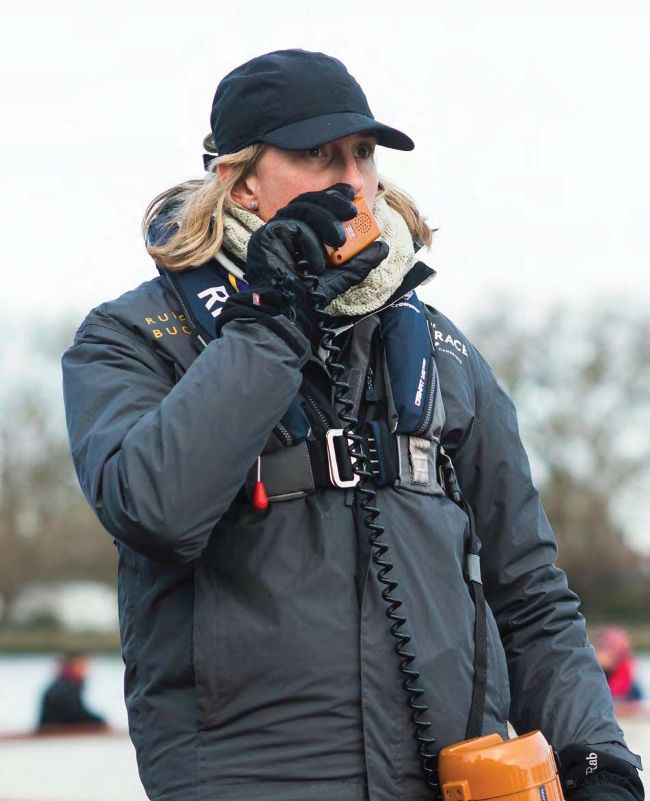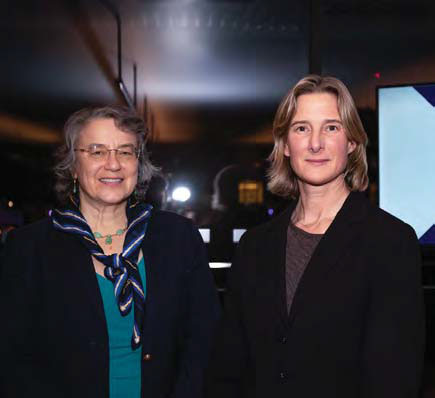Interview with the Umpires
In conversation with Sarah Winckless and Judith Packer, race umpires for the 2021 Boat Races
WORDS: RACHEL HALLIBURTON / PHOTOGRAPHY: BENEDICT TUFNELL

Olympic bronze medallist Sarah Winckless.
In the great script of the 2020 that never was, the Oxford and Cambridge Boat Race on March 29 would have marked the first time that both the men’s and women’s races were umpired by women. Since the men’s race was established in 1829, it had taken almost one hundred years for women to be given their own boat race in 1927. Now, almost a century after that, two women had finally been named to take on one of the simultaneously most influential yet invisible roles in rowing. Then the microbe hit.
Nine months on, as the world puts itself back together, Olympic bronze medallist Sarah Winckless and highly respected international rowing umpire Judith Packer are preparing once more to oversee the two universities doing battle on the river. While Packer umpired the last women’s race to take place at Henley, Winckless will be the first woman ever to umpire the men’s race. Though both agree that this moment has been a long time coming, they are equally emphatic that the rowing community is more than ready. ’Women have been umpiring for a long time, just not in this race,’ says Winckless when I call her. For Packer, who qualified as a British Rowing umpire in 2001 and an international rowing umpire in 2009, ‘It’s a big landmark, but part of me thinks “why hasn’t it happened already?” It’s a celebration of something that’s already established both in the UK and internationally even though it’s been very much under the radar.
Winckless, who was world champion twice and won her Olympic bronze in 2004, was appointed the first female umpire of the Henley Royal Regatta in 2016. She admits that, ‘When I was in races as a rower, I didn’t notice the umpires. I was getting on with doing my work. However, once I began the journey of becoming an umpire, I felt the privilege of being part of this incredible community. I hadn’t appreciated their expertise and dedication.’
“Two women had finally been named to take on one of the simultaneously most powerful and invisible roles in rowing. Then the microbe hit.”
For Packer, their near invisibility is testament to the professionalism of the umpires with whom Winckless has worked. ‘The ideal is that people do not notice you, even though you basically control the race. The two most important qualities in an umpire are composure and awareness, underpinned by the knowledge and application of the rules to ensure a safe race which is fair and gives both crews an equal chance of winning. A huge amount of what happens in a race comes down to the preparation; we brief the crews beforehand, and make sure we know the course, its hazards, where the start and finish lines are, the circulation patterns. By the time we get to the race day much of the work is done.’
This year’s shifting of the race to Ely is going to require a mental adjustment for everyone, not least the Oxford and Cambridge women rowers who only started to compete on the Tideway in 2015. Both Packer and Winckless were appointed to the Boat Race Umpire’s Panel in 2012 in preparation to support this transition. ‘I feel so proud to have been part of the journey to integrate women onto the Tideway,’ Packer says. ‘Every year it feels there’s another step towards integration and parity. In terms of umpiring, I think that when you have women athletes, it just makes sense that the officials can also be women; equality of representation if you will. Although there have been generations of women umpires, they often haven’t been very visible even though they have progressed to senior levels. I hope the Boat Race can inspire more girls and women to participate in sport whether as an athlete or in one of the many official roles that exist.’
‘I feel an optimism when I look at what’s happening in society at the moment,’ declares Winckless. ‘The conversation [about equal opportunities] is happening at every level. I was very lucky - in 1997 [when she joined the Great Britain rowing team] I was among an incredible group of female athletes who wanted to see how far and fast we could go to push boundaries and norms. That said, I still think female athletes are not seen in the same light as male athletes. I hope that there will be a point when the conversation can finish - when it will be perfectly normal for both women and men to be umpiring these races.’

(L-R) Judith Packer and Sarah Winckless.
Packer optimistically describes next year’s move to Ely as, ‘another challenge.’ She and Winckless have already been to do a recce of the course. ‘Trial eights in mid-December will be the first time we put our plans to the test. We are looking through everything we do to make sure it’s all as Covid-secure as possible as well as doing the normal race preparations. Normally we would have quite a big team of umpires available, but now we are keeping numbers to a safe minimum.’
Winckless asserts, ‘I love the fact that people have been inventive and open in putting on a race this year. The decision-making process for Ely has been a really inclusive one. It follows a really challenging year - I became a committee member for Henley Royal Regatta, and my first meeting was the meeting that we cancelled. At that point it was about leadership - what was the right thing to do, to get athletes on the water and show people who were healthy, or keep them off the water as a message about the right way to stay healthy? Back then keeping them off the water was the responsible decision.’
For Packer, though cancellation of the 2020 race was absolutely the right decision, the flip side of the coin was that, ‘It’s not just the athletes who lost out and didn’t manage to race, there was a whole year of young women not being able to see and be inspired by those young women having a race. As I get older I realise it’s very much about being visible for a younger generation.’
Both Packer and Winckless are emphatic that any hindrance to two women umpiring the men and women’s races before now did not come from within the umpiring community itself. ‘I really feel supported and part of a community - when I’m up there, alone in the umpire’s launch I know they’re all behind me,’ says Packer. Winckless agrees. ‘When I was asked to become an umpire for this race at first I said no. Then I became excited at the idea of being part of this race in a different way. Since Judith and I have become members of the umpire panel, we’ve been made incredibly welcome. I think while it has taken a long time for this moment to come, once the doors were opened the system was very accepting.’